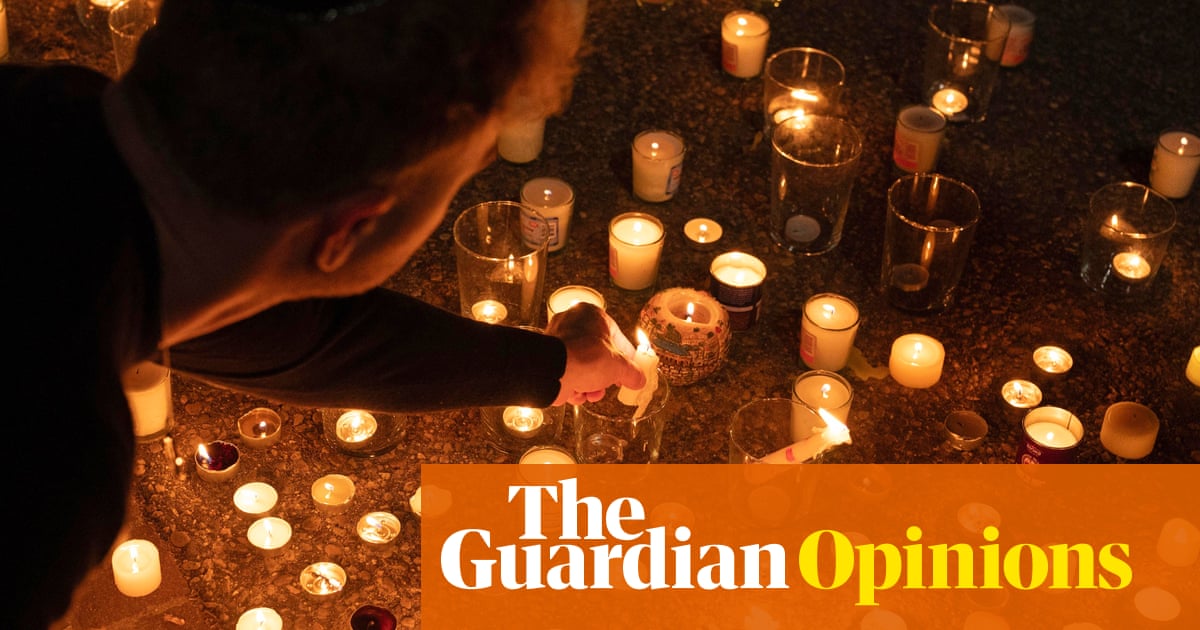The killing of two Israeli embassy staffers inWashington DCon Wednesday night is unconscionable. The victims, Yaron Lischinsky and Sarah Milgrim, should be alive, and justice must be meted out to their assailant. This brazen act of political violence in the heart of the nation’s capital only underscores the obvious: all this violence – whether it’s in Washington DC, Gaza, Jenin or Israel, and whether it’s by bullet, bomb or forced starvation – all of it must end, and it must end immediately.
What weknowso far is that shortly after 9pm on Wednesday evening, a gunman approached a group of four people who were departing an event at the Capital Jewish Museum that had been hosted by the American Jewish Committee. (It’s beenreportedthat the event “focused on bringing humanitarian aid to Gaza through Israeli-Palestinian and regional collaboration”.) The suspected gunman, identified in media accounts as 31-year-old Elias Rodriguez from Chicago, had been seen pacing outside the museum when hespottedthe group of four leaving the building. He opened fire on the group, fatally wounding two at close range. He then entered the building, where he was detained by event security. He can be seen onvideoin handcuffs and chanting “free, free Palestine”.
Needless to say, criminal actions such as this reprehensible murder do not advance the cause of Palestinian liberation or anyone’s freedom. This stupid and horrific act must be opposed not only for its immorality but also because the world needs to focus on pressuring Israel to end its blockade of Gaza and allow the flow of humanitarian aid into the besieged territory before tens of thousands of Palestinians – including14,000 babies, according to the United Nations – die from forced starvation in the coming days.
Already, the Israeli government is using the murder to wag its finger at Israel’s critics and deflect from its own actions. In a press conference in Jerusalem, Gideon Sa’ar, the Israeli foreign minister,blamed“leaders and officials of many countries and international organizations, especially from Europe” for inciting violence against Israel, incitement which he said led “in a direct line … to this murder”.
The idea that European leaders are directly responsible for this heinous murder is nothing short of ridiculous, of course. But it does show how nervous the Israeli government is about a new wave of criticism being directed against its assault on Gaza. Earlier, on 21 May, the UK development minister, Jenny Chapman,toldthe BBC that Israel is “using hunger as a weapon of war” in Gaza. The foreign secretary, David Lammy, alsocalledIsrael’s planned military escalation in Gaza “morally unjustifiable, wholly disproportionate and utterly counterproductive”, and Keir Starmer, the UK prime minister, recently stated that Britain “cannot allow the people of Gaza to starve” and that levels of suffering in Gaza were “utterly intolerable”.
In addition, the UK has suspended free trade talks with Israel, and EU foreign ministers are reviewing the European Union’s trade agreement with Israel over its blockading of food, water, medicine and other needed supplies for Gazans’ survival. While these actions are welcome, they’re also a case of too little, too late. And despite a partial UK arms embargo on Israel, the UK government stillapproved licensesfor £127.6m of military equipment to Israel, more than the combined total for 2020-23,accordingto the group Campaign Against the Arms Trade.
In other words, the violence is intensifying, enabled in part because those who arm Israel continue to do so. It’s also expanding, and not just on to the streets of Washington DC. Consider what happened on the same day as the tragic killing of the Israeli embassy staffers. A delegation of diplomats representing 31 different countries were on an official mission to observe the humanitarian situation in the West Bank city of Jenin, which has also been undersustained assaultby Israel for the last 120 days. The Israeli military shot towards the delegation of diplomats, and later claimed the group had “deviated from the approved route”.
Once upon a time, to be a diplomat meant you were afforded a certain amount of security, but those were times when we, perhaps naively, believed there were rules governing warfare. What do we have now? Shots fired as diplomats carry out their jobs. Food used as a weapon of war. Young embassy staffers assassinated in public.
This killing must end. We all know it, just as we know that it must start with an immediate and permanent ceasefire, the return of all captives taken on 7 October and after, and the full resumption of aid into Gaza. The details of what happens in the medium and long term, for both Israelis and Palestinians, can and must be forged through honest dialogue and not by the mass displacement and extermination of the Palestinian people.
But rather than heeding this lesson, we will likely witness in the days ahead an all-out push to discredit those who oppose Israel’s military campaign, which has been labeled a genocide by multipleinternationalhuman rights organizations, among many others. Israel’s foreign minister has already started. In his press conference, Sa’arclaimedthat it was the talk that Israel is committing “genocide, crimes against humanity and murdering babies” that “pave[s] the way exactly for such murders” as happened in Washington DC.
But genocide, crimes against humanity and babies being killed are all happening, and millions are stating their loud opposition to Israeli actions without resorting to murderous political violence. In fact, that’s exactly what we must do, and we must do that now, louder and stronger than ever, before this violence grows and spreads further, consuming even more innocent lives in its monstrous path.
Moustafa Bayoumi is a Guardian US columnist
